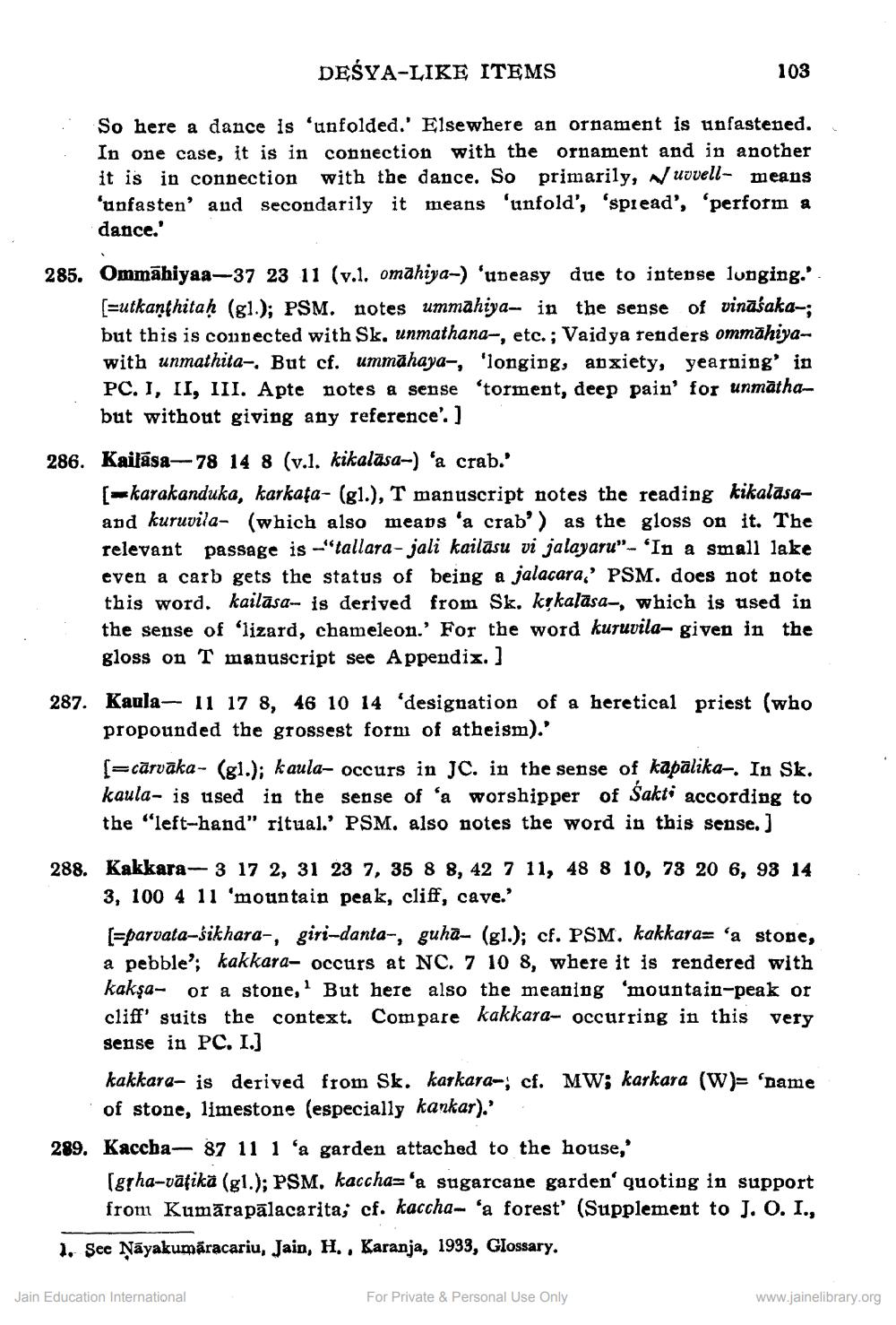________________
DEŚYA-LIKE ITEMS
103
So here a dance is 'unfolded.' Elsewhere an ornament is unfastened. In one case, it is in connection with the ornament and in another it is in connection with the dance. So primarily, Nuvvell- means 'unfasten' and secondarily it means 'unfold', 'spread', 'perform a dance.'
285. Ommāhiyaa-37 23 11 (v.1. omahiya-) 'upeasy due to intense lunging.'.
[=utkanthitaḥ (gl.); PSM. notes ummahiya- in the sense of vinasaka-; but this is connected with Sk, unmathana-, etc.; Vaidya renders ommahiyawith unmathita-, But cf. ummahaya-, 'longing, anxiety, yearning' in PC. I, II, III. Apte notes a sense 'torment, deep pain' for unmathabut without giving any reference'. )
286. Kailasa-78 14 8 (v.1. kikalāsa-) a crab.
[karakanduka, karkața- (gl.), T manuscript notes the reading kikalasaand kuruvila- (which also meavs 'a crab') as the gloss on it. The relevant passage is --"tallara- jali kailāsu vi jalayaru"- "In a small lake even a carb gets the status of being a jalacara,' PSM. does not note this word. kailasa- is derived from Sk, kykalasa-, which is used in the sense of 'lizard, chameleon.' For the word kuruvila- given in the gloss on T manuscript see Appendix. ]
287. Kaula— 11 17 8, 46 10 14 'designation of a heretical priest (who
propounded the grossest form of atheism).' [=cārvaka- (gi.); kaula- occurs in JC. in the sense of kapalika-, In Sk. kaula- is used in the sense of a worshipper of Sakti according to the "left-hand" ritual.' PSM. also notes the word in this sens
288. Kakkara- 3 17 2, 31 23 7, 35 8 8, 42 7 11, 48 8 10, 73 20 6, 93 14
3, 100 4 11 'mountain peak, cliff, cave.' [=parvata-śikhara-, giri-danta-, guha- (gl.); cf. PSM, kakkara= 'a stone, a pebble'; kakkara- occurs at NC. 7 10 8, where it is rendered with kakşa- or a stone, But here also the meaning "mountain-peak or cliff' suits the context. Compare kakkara- occurring in this very sense in PC. I.) kakkara- is derived from Sk. karkara-; cf. MW; karkara (W)= 'Dame
of stone, limestone (especially kankar).' 289. Kaccha- 87 11 1 'a garden attached to the house,'
(grha-vātikā (gl.); PSM. kaccha='a sugarcane garden' quoting in support from Kumārapālacarita; cf. kaccha- 'a forest' (Supplement to J. O. I.,
1. Sec Ņāyakumaracariu, Jain, H., Karanja, 1933, Glossary.
Jain Education International
For Private & Personal Use Only
www.jainelibrary.org




